UNCC Catholic Social Thought: Self, Community, and Core Principles
VerifiedAdded on 2023/06/14
|5
|1342
|416
Essay
AI Summary
This essay delves into the principles of Catholic Social Thought (CST), emphasizing their meaning, significance, and application to the relationship between the individual (self) and the community. It highlights five key principles: human dignity, solidarity, stewardship of creation, the common good, and the preferential option for the poor. Human dignity underscores the inherent value of each individual as created in God's image. Solidarity stresses our interconnectedness and responsibility for one another. Stewardship of creation calls for respect and protection of the environment. The common good focuses on promoting a just society that supports human dignity and growth. The preferential option for the poor prioritizes the needs of vulnerable populations. The essay concludes that these principles are essential for Christians, guiding them towards a life aligned with Christian values and promoting the well-being of both individuals and the community.
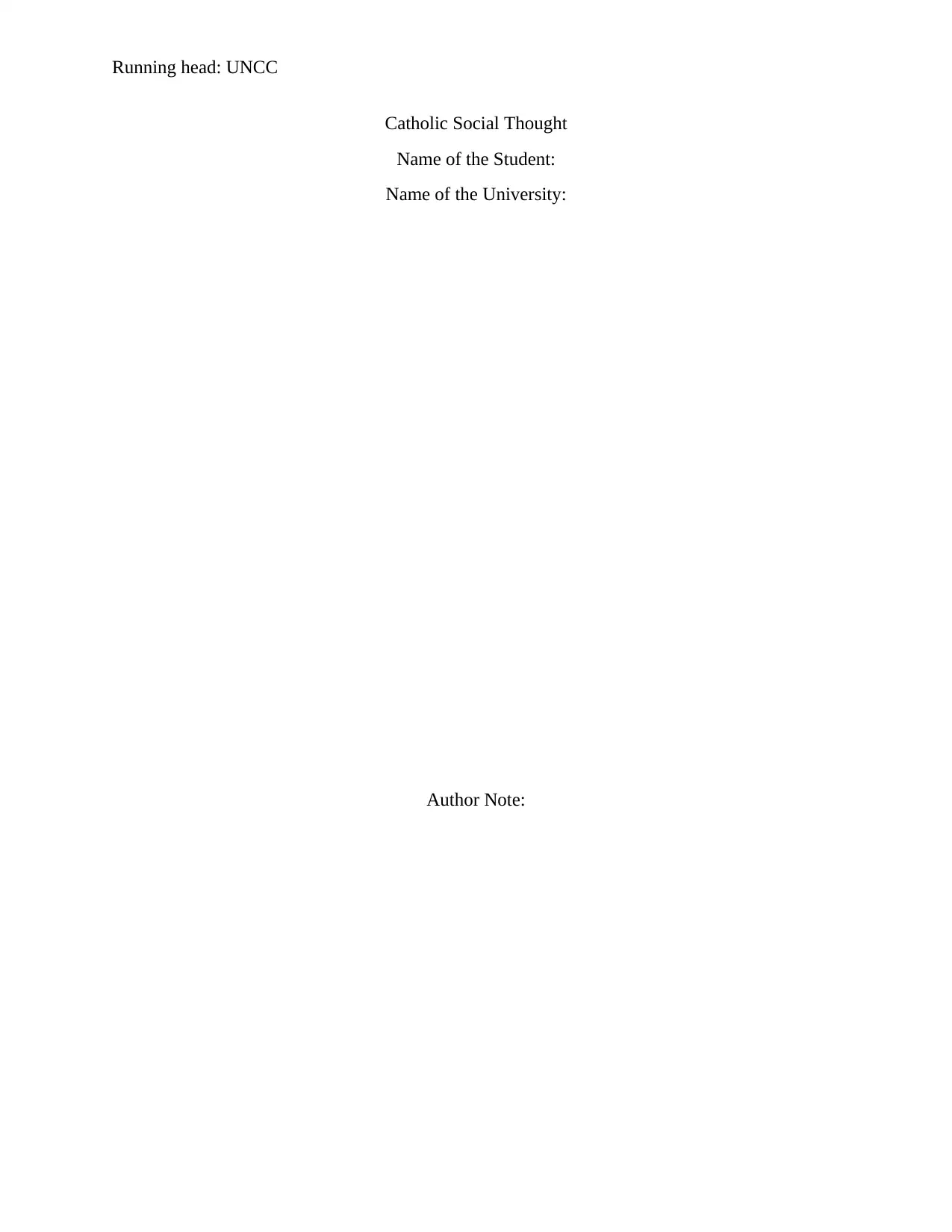
Running head: UNCC
Catholic Social Thought
Name of the Student:
Name of the University:
Author Note:
Catholic Social Thought
Name of the Student:
Name of the University:
Author Note:
Paraphrase This Document
Need a fresh take? Get an instant paraphrase of this document with our AI Paraphraser
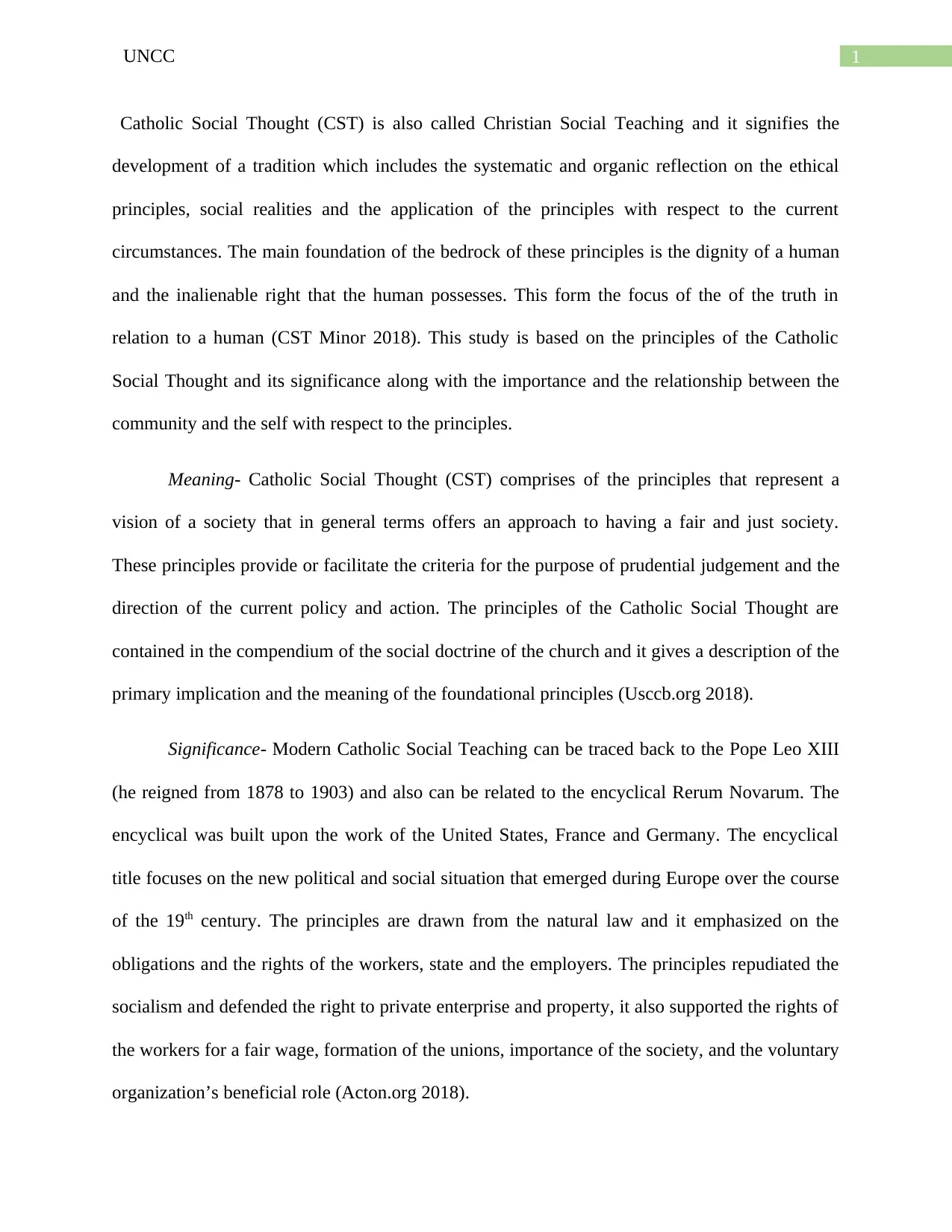
1UNCC
Catholic Social Thought (CST) is also called Christian Social Teaching and it signifies the
development of a tradition which includes the systematic and organic reflection on the ethical
principles, social realities and the application of the principles with respect to the current
circumstances. The main foundation of the bedrock of these principles is the dignity of a human
and the inalienable right that the human possesses. This form the focus of the of the truth in
relation to a human (CST Minor 2018). This study is based on the principles of the Catholic
Social Thought and its significance along with the importance and the relationship between the
community and the self with respect to the principles.
Meaning- Catholic Social Thought (CST) comprises of the principles that represent a
vision of a society that in general terms offers an approach to having a fair and just society.
These principles provide or facilitate the criteria for the purpose of prudential judgement and the
direction of the current policy and action. The principles of the Catholic Social Thought are
contained in the compendium of the social doctrine of the church and it gives a description of the
primary implication and the meaning of the foundational principles (Usccb.org 2018).
Significance- Modern Catholic Social Teaching can be traced back to the Pope Leo XIII
(he reigned from 1878 to 1903) and also can be related to the encyclical Rerum Novarum. The
encyclical was built upon the work of the United States, France and Germany. The encyclical
title focuses on the new political and social situation that emerged during Europe over the course
of the 19th century. The principles are drawn from the natural law and it emphasized on the
obligations and the rights of the workers, state and the employers. The principles repudiated the
socialism and defended the right to private enterprise and property, it also supported the rights of
the workers for a fair wage, formation of the unions, importance of the society, and the voluntary
organization’s beneficial role (Acton.org 2018).
Catholic Social Thought (CST) is also called Christian Social Teaching and it signifies the
development of a tradition which includes the systematic and organic reflection on the ethical
principles, social realities and the application of the principles with respect to the current
circumstances. The main foundation of the bedrock of these principles is the dignity of a human
and the inalienable right that the human possesses. This form the focus of the of the truth in
relation to a human (CST Minor 2018). This study is based on the principles of the Catholic
Social Thought and its significance along with the importance and the relationship between the
community and the self with respect to the principles.
Meaning- Catholic Social Thought (CST) comprises of the principles that represent a
vision of a society that in general terms offers an approach to having a fair and just society.
These principles provide or facilitate the criteria for the purpose of prudential judgement and the
direction of the current policy and action. The principles of the Catholic Social Thought are
contained in the compendium of the social doctrine of the church and it gives a description of the
primary implication and the meaning of the foundational principles (Usccb.org 2018).
Significance- Modern Catholic Social Teaching can be traced back to the Pope Leo XIII
(he reigned from 1878 to 1903) and also can be related to the encyclical Rerum Novarum. The
encyclical was built upon the work of the United States, France and Germany. The encyclical
title focuses on the new political and social situation that emerged during Europe over the course
of the 19th century. The principles are drawn from the natural law and it emphasized on the
obligations and the rights of the workers, state and the employers. The principles repudiated the
socialism and defended the right to private enterprise and property, it also supported the rights of
the workers for a fair wage, formation of the unions, importance of the society, and the voluntary
organization’s beneficial role (Acton.org 2018).
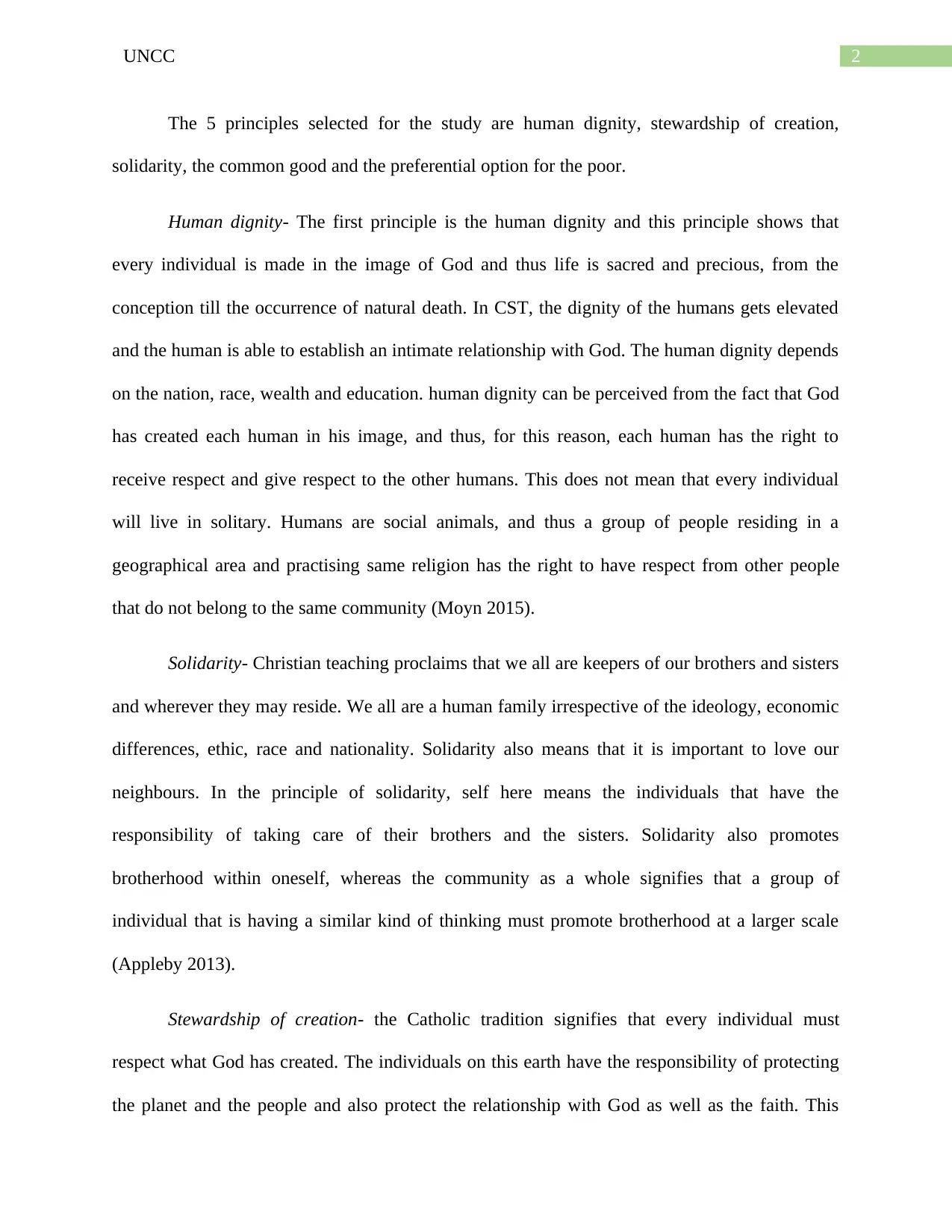
2UNCC
The 5 principles selected for the study are human dignity, stewardship of creation,
solidarity, the common good and the preferential option for the poor.
Human dignity- The first principle is the human dignity and this principle shows that
every individual is made in the image of God and thus life is sacred and precious, from the
conception till the occurrence of natural death. In CST, the dignity of the humans gets elevated
and the human is able to establish an intimate relationship with God. The human dignity depends
on the nation, race, wealth and education. human dignity can be perceived from the fact that God
has created each human in his image, and thus, for this reason, each human has the right to
receive respect and give respect to the other humans. This does not mean that every individual
will live in solitary. Humans are social animals, and thus a group of people residing in a
geographical area and practising same religion has the right to have respect from other people
that do not belong to the same community (Moyn 2015).
Solidarity- Christian teaching proclaims that we all are keepers of our brothers and sisters
and wherever they may reside. We all are a human family irrespective of the ideology, economic
differences, ethic, race and nationality. Solidarity also means that it is important to love our
neighbours. In the principle of solidarity, self here means the individuals that have the
responsibility of taking care of their brothers and the sisters. Solidarity also promotes
brotherhood within oneself, whereas the community as a whole signifies that a group of
individual that is having a similar kind of thinking must promote brotherhood at a larger scale
(Appleby 2013).
Stewardship of creation- the Catholic tradition signifies that every individual must
respect what God has created. The individuals on this earth have the responsibility of protecting
the planet and the people and also protect the relationship with God as well as the faith. This
The 5 principles selected for the study are human dignity, stewardship of creation,
solidarity, the common good and the preferential option for the poor.
Human dignity- The first principle is the human dignity and this principle shows that
every individual is made in the image of God and thus life is sacred and precious, from the
conception till the occurrence of natural death. In CST, the dignity of the humans gets elevated
and the human is able to establish an intimate relationship with God. The human dignity depends
on the nation, race, wealth and education. human dignity can be perceived from the fact that God
has created each human in his image, and thus, for this reason, each human has the right to
receive respect and give respect to the other humans. This does not mean that every individual
will live in solitary. Humans are social animals, and thus a group of people residing in a
geographical area and practising same religion has the right to have respect from other people
that do not belong to the same community (Moyn 2015).
Solidarity- Christian teaching proclaims that we all are keepers of our brothers and sisters
and wherever they may reside. We all are a human family irrespective of the ideology, economic
differences, ethic, race and nationality. Solidarity also means that it is important to love our
neighbours. In the principle of solidarity, self here means the individuals that have the
responsibility of taking care of their brothers and the sisters. Solidarity also promotes
brotherhood within oneself, whereas the community as a whole signifies that a group of
individual that is having a similar kind of thinking must promote brotherhood at a larger scale
(Appleby 2013).
Stewardship of creation- the Catholic tradition signifies that every individual must
respect what God has created. The individuals on this earth have the responsibility of protecting
the planet and the people and also protect the relationship with God as well as the faith. This
⊘ This is a preview!⊘
Do you want full access?
Subscribe today to unlock all pages.

Trusted by 1+ million students worldwide
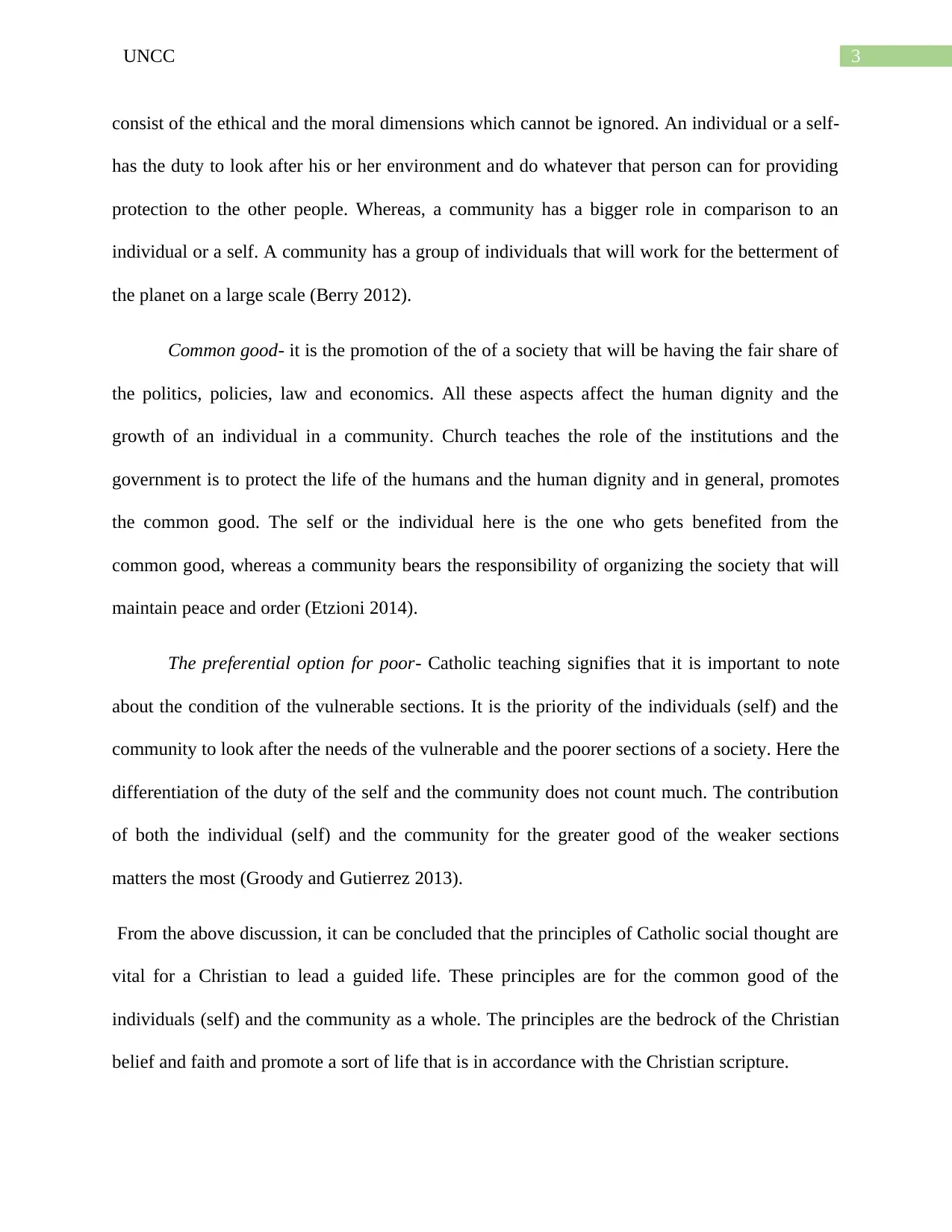
3UNCC
consist of the ethical and the moral dimensions which cannot be ignored. An individual or a self-
has the duty to look after his or her environment and do whatever that person can for providing
protection to the other people. Whereas, a community has a bigger role in comparison to an
individual or a self. A community has a group of individuals that will work for the betterment of
the planet on a large scale (Berry 2012).
Common good- it is the promotion of the of a society that will be having the fair share of
the politics, policies, law and economics. All these aspects affect the human dignity and the
growth of an individual in a community. Church teaches the role of the institutions and the
government is to protect the life of the humans and the human dignity and in general, promotes
the common good. The self or the individual here is the one who gets benefited from the
common good, whereas a community bears the responsibility of organizing the society that will
maintain peace and order (Etzioni 2014).
The preferential option for poor- Catholic teaching signifies that it is important to note
about the condition of the vulnerable sections. It is the priority of the individuals (self) and the
community to look after the needs of the vulnerable and the poorer sections of a society. Here the
differentiation of the duty of the self and the community does not count much. The contribution
of both the individual (self) and the community for the greater good of the weaker sections
matters the most (Groody and Gutierrez 2013).
From the above discussion, it can be concluded that the principles of Catholic social thought are
vital for a Christian to lead a guided life. These principles are for the common good of the
individuals (self) and the community as a whole. The principles are the bedrock of the Christian
belief and faith and promote a sort of life that is in accordance with the Christian scripture.
consist of the ethical and the moral dimensions which cannot be ignored. An individual or a self-
has the duty to look after his or her environment and do whatever that person can for providing
protection to the other people. Whereas, a community has a bigger role in comparison to an
individual or a self. A community has a group of individuals that will work for the betterment of
the planet on a large scale (Berry 2012).
Common good- it is the promotion of the of a society that will be having the fair share of
the politics, policies, law and economics. All these aspects affect the human dignity and the
growth of an individual in a community. Church teaches the role of the institutions and the
government is to protect the life of the humans and the human dignity and in general, promotes
the common good. The self or the individual here is the one who gets benefited from the
common good, whereas a community bears the responsibility of organizing the society that will
maintain peace and order (Etzioni 2014).
The preferential option for poor- Catholic teaching signifies that it is important to note
about the condition of the vulnerable sections. It is the priority of the individuals (self) and the
community to look after the needs of the vulnerable and the poorer sections of a society. Here the
differentiation of the duty of the self and the community does not count much. The contribution
of both the individual (self) and the community for the greater good of the weaker sections
matters the most (Groody and Gutierrez 2013).
From the above discussion, it can be concluded that the principles of Catholic social thought are
vital for a Christian to lead a guided life. These principles are for the common good of the
individuals (self) and the community as a whole. The principles are the bedrock of the Christian
belief and faith and promote a sort of life that is in accordance with the Christian scripture.
Paraphrase This Document
Need a fresh take? Get an instant paraphrase of this document with our AI Paraphraser
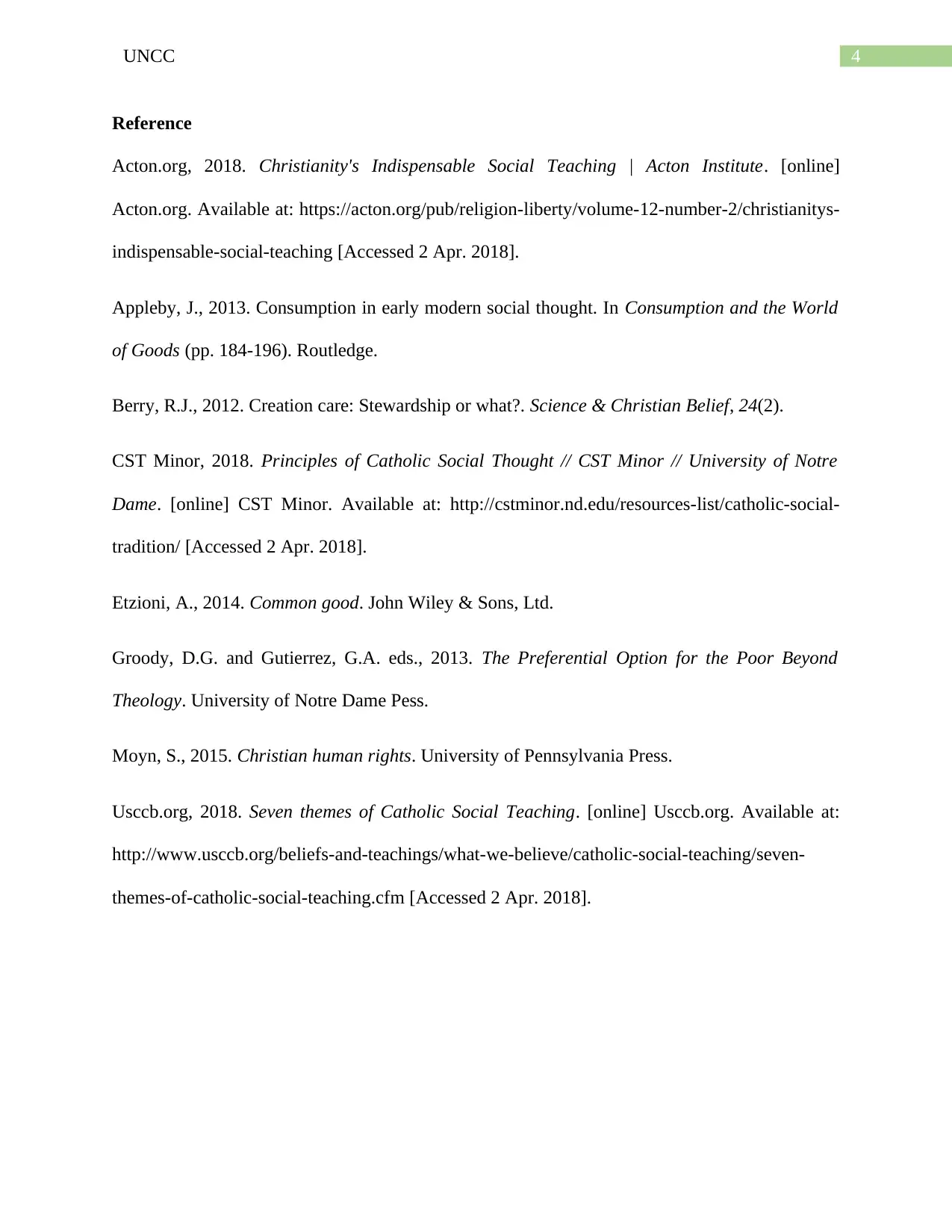
4UNCC
Reference
Acton.org, 2018. Christianity's Indispensable Social Teaching | Acton Institute. [online]
Acton.org. Available at: https://acton.org/pub/religion-liberty/volume-12-number-2/christianitys-
indispensable-social-teaching [Accessed 2 Apr. 2018].
Appleby, J., 2013. Consumption in early modern social thought. In Consumption and the World
of Goods (pp. 184-196). Routledge.
Berry, R.J., 2012. Creation care: Stewardship or what?. Science & Christian Belief, 24(2).
CST Minor, 2018. Principles of Catholic Social Thought // CST Minor // University of Notre
Dame. [online] CST Minor. Available at: http://cstminor.nd.edu/resources-list/catholic-social-
tradition/ [Accessed 2 Apr. 2018].
Etzioni, A., 2014. Common good. John Wiley & Sons, Ltd.
Groody, D.G. and Gutierrez, G.A. eds., 2013. The Preferential Option for the Poor Beyond
Theology. University of Notre Dame Pess.
Moyn, S., 2015. Christian human rights. University of Pennsylvania Press.
Usccb.org, 2018. Seven themes of Catholic Social Teaching. [online] Usccb.org. Available at:
http://www.usccb.org/beliefs-and-teachings/what-we-believe/catholic-social-teaching/seven-
themes-of-catholic-social-teaching.cfm [Accessed 2 Apr. 2018].
Reference
Acton.org, 2018. Christianity's Indispensable Social Teaching | Acton Institute. [online]
Acton.org. Available at: https://acton.org/pub/religion-liberty/volume-12-number-2/christianitys-
indispensable-social-teaching [Accessed 2 Apr. 2018].
Appleby, J., 2013. Consumption in early modern social thought. In Consumption and the World
of Goods (pp. 184-196). Routledge.
Berry, R.J., 2012. Creation care: Stewardship or what?. Science & Christian Belief, 24(2).
CST Minor, 2018. Principles of Catholic Social Thought // CST Minor // University of Notre
Dame. [online] CST Minor. Available at: http://cstminor.nd.edu/resources-list/catholic-social-
tradition/ [Accessed 2 Apr. 2018].
Etzioni, A., 2014. Common good. John Wiley & Sons, Ltd.
Groody, D.G. and Gutierrez, G.A. eds., 2013. The Preferential Option for the Poor Beyond
Theology. University of Notre Dame Pess.
Moyn, S., 2015. Christian human rights. University of Pennsylvania Press.
Usccb.org, 2018. Seven themes of Catholic Social Teaching. [online] Usccb.org. Available at:
http://www.usccb.org/beliefs-and-teachings/what-we-believe/catholic-social-teaching/seven-
themes-of-catholic-social-teaching.cfm [Accessed 2 Apr. 2018].
1 out of 5
Related Documents
Your All-in-One AI-Powered Toolkit for Academic Success.
+13062052269
info@desklib.com
Available 24*7 on WhatsApp / Email
![[object Object]](/_next/static/media/star-bottom.7253800d.svg)
Unlock your academic potential
Copyright © 2020–2026 A2Z Services. All Rights Reserved. Developed and managed by ZUCOL.




